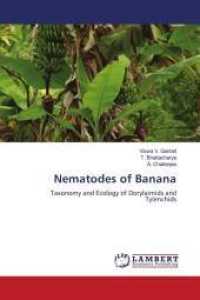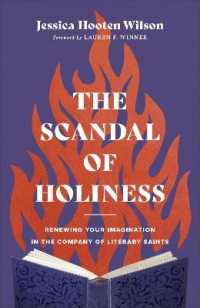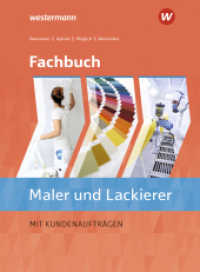- ホーム
- > 洋書
- > 英文書
- > Politics / International Relations
Full Description
Is it possible to be `irrational' without being `uneconomic'? What is the link between `Value' and `values'? What do economists do when they `explain'? We live in times when the economic logic has become unquestionable and all-powerful so that our quotidian economic experiences are defined by their scientific construal. This book is the result of a multifaceted investigation into the nature of knowledge produced by economics, and the construction of the category that is termed `economic' with its implied exclusions. It is an attempt to think economics Otherwise, that is, a questioning of economics as if difference mattered.Nitasha Kaul re-examines certain understood ways of thinking about economics as a discipline, especially in relation to questions of identity and difference. This book explores the notion that economics is not a timeless, universal, objective science but a changing response to the problems of knowledge and administration. The epistemological inheritance of economics is `rooted' in the enlightenment, and it also inherits the liberal paradoxes of that age. Kaul argues that the juxtaposition of identity with economic (culture/economy) is essential, and can only be achieved by critiquing establishment economists' discourse on identity, and taking feminist poststructural and postcolonial work seriously. The author challenges the assumption that there is a simple linkage between the category economic, the entity economy and the study of economics. She envisions an economics in the plural: contextual, social, political - econo-mixes. This book brings together some of the most urgent topics of the day - the power of economics as a discipline, the questions of difference and the politics of identity, and feminist perspectives on this. It will be particularly relevant to heterodox economists, feminist theorists, postcolonial studies scholars, social and cultural theorists, philosophers and history of ideas or intellectual history of thought scholars.
Contents
Part 1The Writing of Theory in Economics 1.3 The Overview 1.4 Signpost Part 2: Rooting and Routing Economics 2. Enlightenment Epistemology and the Subject-World of Economics 2.1 Introduction 2.2 Enterprise of Economics 2.3 Enlightenment and Epistemology 2.4 Subject-World of Economics 2.5 The Theory and Science of Economics 2.6 Mathematical Formalism, Representation and the Moralisation of Objectivity 2.7 Conclusion Part 3: Issues of Knowledge and Difference 3. Modernist Rendition of Knowledge and the Question of Difference 3.1 Introduction 3.2 Time and the Other of Modernist Knowledge 3.3 Rousseau's Discourse On Political Economy 3.4 Subjectivity of Modernist Knowledge and the Transcendental Pretence 3.5 Reason, History and the Hegelian Dialectic 3.6 Human Nature and the Question of Difference 3.7 The Postcolonial Moment in Epistemology 3.8 Conclusion Part 4: Juxtaposing Questions of Identity and the Economic 4. Identity Problematics 4.1 On Identity 4.2 Abstract Essentialist Individual Identity 4.3 Critiquing the Abstract Essentialist Individual View of Identity 4.4 The Orthodox and the Heterodox: A Possible Dialogue 4.5 Rethinking the Relation of Identity and Difference in Knowledge 4.6 The Politics of Identity 5. Economics and Identity 5.1 Expanding 'Economics Inc.' (Economics Incorporated)? 5.2 Illustration One: Akerlof and Kranton on 'Economics and Identity' 5.3 Illustration Two: Sen On 'Reason Before Identity' 6. Rethinking Identity Translationally and Reconsidering the Economic 6.1 Introduction 6.2 Concentric and Translational Architectures of Identity 6.3 Identity : Economic: Culture: Economy 6.4 Conclusion Part 5: In Conclusion 7. Writing Economic Theory Another Way 7.1 A Recap 7.2 Writing Economic Theory Another Way 7.3 Pedagogy Re-Visited: Contextual Social Political Economices 7.4 Conclusion: Penpoints On Mirrors







